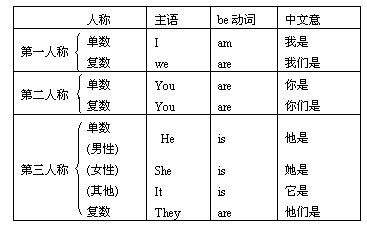1 be动词的现在时
be动词的句型如下:
肯定句:主语+be动词~。
否定句:主语+be动词+not~。
疑问句:Be动词+主语~?
1主语与be动词
She is my classmate.
她是我的同学。
1.be动词的现在式有am,are,is三种,分别接在不同人称的主语之后。下面,我们用图表来表示:

注意
be动词的意义,除了有“……是……”,还有……在……”的意思。
Mary is a student.
玛莉是一名学生。
He is at school.
他在学校。
I am a teacher.(接名词)
我是一个老师。
She is beautiful(接形容词)
她是漂亮的。
She is very beautiful.(接副词)
她是非常的漂亮。
注意
be 动词之后可接不同词性的词。
2 be动词的否定句
I am not a teacher.
我不是一个老师。
be动词(现在时)否定句的结构,如上面例句,只要在be动词am,are,is的后面加not,其句型是:
《主语+be动词+not~.》。
《肯定句》It is a book. 它是一本书。
《否定句》It is not a book. 它不是一本书。
《缩写式》It isn't a book.
《肯定句》You are a student. 你是一位学生。
《否定句》You are not a student. 你不是一位学生。
《缩写式》You aren't a student.
I am not a student. 我不是一位学生。
I'm not a student.
I'm读作[%!P]
be动词否定句的缩写方式
a .is not缩写是isn't,读作[>!LQC]。
b. are not的缩写是aren't,读作[%:QC]。
c.缩写记号,要放在被省略的字上方。
d. I am~.的否定句是I am not~,缩写为I'm not~.am not,不缩写在起。
3 be动词的一般疑问句
Are you a nurse?
你是一位护士吗?
1.be动词(现在时)疑问句的结构
其句型是把be动词调到主语前面,即《Be动词+主语~?》。
《肯定句》You are a student.你是一位学生。
《疑问句》Are you a student?你是一位学生吗?
2.一般疑问句的回答方式
a.在回答由be动词构成的疑问句时,要用Yes或No,句型如下:
是Yes,+主语+be动词.
否No,+主语+be动词+not.
注意
Yes或No的后面一定要有逗点,逗点后所加的主语不能大写,除了I(我)例外。
Are you a student?
你是一位学生吗?
Yes,I am.
是的,我是。
注意
问句中的you(你)回答时改为I(我),I永远用大写。
Is your book on the table?
你的书在桌子上吗?
No, it isn’t.
不,它不在。
注意
your book是第三人称单数,回答时要代换为it。
b.在回答的句子中,主语必须是代词。
Is John a student?
约翰是一位学生吗?
Yes, he is.
是的,他是。
Is Mary a nurse?
玛莉是一位护士吗?
Yes,she is.
是的,她是。
3.用What和 Who等疑问词和be动词构成的问句称特殊疑问句。What用在问句“……是什么?”,Who用在问句“……是谁?”。What和Who的句型是:What(Who)+be动词+主语~?
What is this?
这是什么?
It is table.
它是一张桌子。
注意
回答特殊疑问句时不用Yes或 No。
What are they?
他们是干什么的?
They are workers.
他们是工人。
Who is he?
他是谁?
He is John.
他是约翰。
数种疑问句
What什么
Who谁
Which哪个
Where哪里
When何时
Why为什么
How如何

1.There is(are)的用法
a.主语是单数名词时用There is
→There is+单数名词+表示场所的字.
主语是复数名词时用There are
→There are+复数名词+表示场所的字.
There is a bed in this room.
这房间里有一张床。
There are many eggs in the kitchen.
厨房里有很多蛋。
b. There is +不定主语~.→The +主语+is(are)~.
在There is的句型中,后面要加不定主语,即用冠词a加在名词前。如果主语为特定物,则用定冠词The加在名词前,并且把句型改成:
The +主语+is(are)~.
There is a book on the table.
桌上有一本书。…(不特定)
The book is on the table
那本书在桌上。…(特定)
c. there的意思
My school is there.这个句子中的there表示“那里”的意思。There is(are)中的there则不是“那里”的意思。当我们要明确地表达“在那里有……”的意思时,则必须重复使用there。
There is a school there.那里有一所学校。
2.There is(are)的否定句与疑问句
There is(are)~.的否定句是在is(are)的后面加not。
疑问句则是将is(are)调到there的前面。
There is not a bed in this room.
这房间里没有一张床。
Are there many eggs in the kitchen?
厨房里有许多蛋吗?
3.Here的句型
a.《Here is(are)~.》是“这里有……”的意思。
Here are two boys.
这里有两个男孩。
Here is the ticket for you.
你要的车票在这里。
b.主语为名词时,动词在名词之前,主语为代词时,动词在代词之后。
Here comes the teacher.
老师来了。
Here he comes.
他来了。
注意
Here you are.
这个就是。
(口语形式,拿东西给对方时)